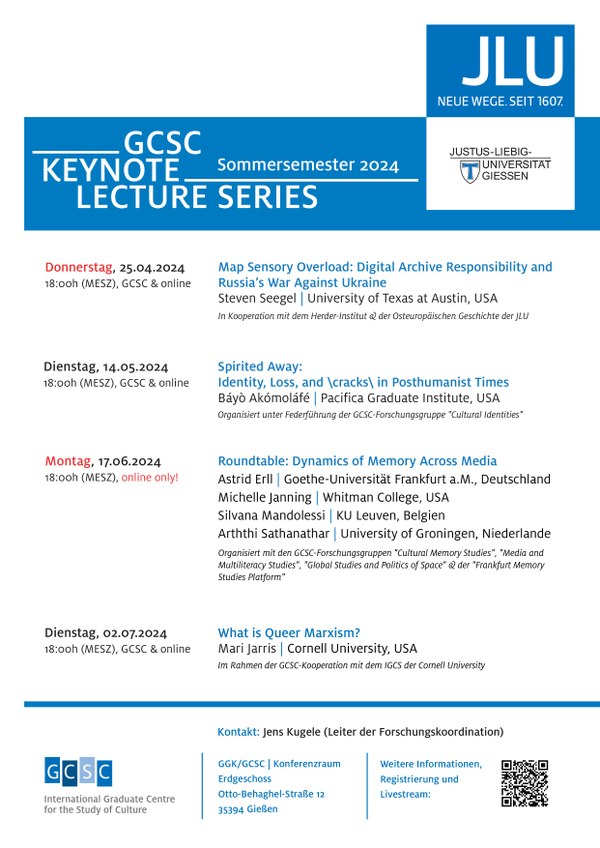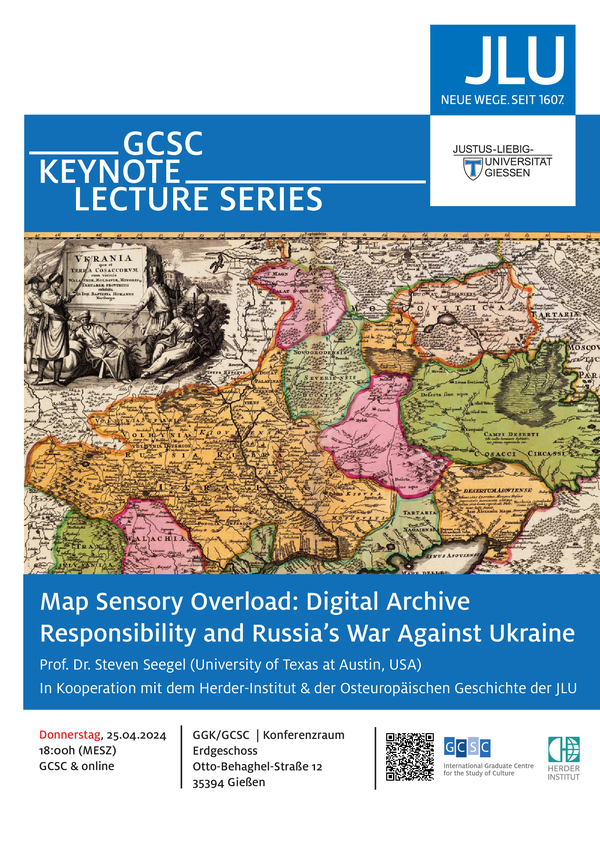SoSe 24
The GCSC Keynote Lecture Series is open to anyone interested in attending. To provide relevant topics for the diverse set of research interests pursued within the GCSC, the lectures in this series are positioned for an interdisciplinary spectrum of listeners and centred on current concepts, questions and theories within the study of culture.
The lectures are oriented according to the research areas of the GCSC and deliver theoretical and methodological impulses.
Download the programme of the current semester here
Go to the KNL Series video archive
Summer Semester 2024
Prof. Dr. Steven Seegel (University of Texas at Austin, USA)
Map Sensory Overload: Digital Archive Responsibility and Russia`s War Against Ukraine
25.04.2024, 18:00-20:00 (CEST), GGK/GCSC (KFR) & Online (BBB)
For a digitally activist Ukraine, the February 24th Archive is a polyphonic treasure trove of global solidarity and resistance. My archive bridges six main groups: (1) professionally trained field experts in Ukrainian Studies; (2) interested nonspecialists in and beyond academe; (3) leading journalists; (4) OSINT amateurs and mapmakers, who catalogue war crimes and build cases with evidence for criminal prosecution; (5) diplomats and policymakers; and (6) most crucially, a voting citizenry that crosses ideological lines, hoping to raise literacy against malignant disinformation. While social media divides and polarizes, I will introduce strategies on how I have based my rolling public war archive in the working commons.
In cooperation with the Herder-Institut & the East European History department, JLU
Prof. Dr. Báyò Akómoláfé (Pacifica Graduate Institute, USA)
Spirited Away: Identity, Loss, and \cracks\ in Posthumanist Times
14.05.2024, 18:00-20:00 (CEST), GGK/GCSC (KFR) & Online (BBB)
"Like eddies of dust raised by the wind as it passes, the living turn upon themselves, borne by the great blast of life. They are therefore relatively stable, and counterfeit immobility so well that we treat each of them as a thing rather than as a progress, forgetting that the very permanence of their form is only the outline of a movement." - Henri Bergson
Afro-Martiniquan philosopher Edouard Glissant once wrote: "Relation struggles and states itself in opacity. It defers self-importance. Relation does not assert Being, except to distract." Glissant's metaphysics of lines and Bergson's noticing that identity is the outline of a movement "counterfeiting immobility" are threaded through Dr. Akomolafe's posthumanist reworking of identity as thermal containment, as a moral technology for forging technologies of presence - however risky the prospects of presence are. In this lecture, Dr. Akomolafe uses the parabolic vehicle of "The Spaceship Human" and the "Afrocene" to suggest that the conditions that make identity a moral tool for claiming territory are overwhelmed by new deterritorializing forces at work. Identity seems to be bound up in persistent notions of the self, ideas of mastery, and the benefits of neurotypical citizenry. Perhaps, to critically address these moments, to cultivate new kinds of subjectivities, is to lose one's way, to forge new alliances. To be spirited away.
Organised by the RA 6 "Cultural Identities"
Roundtable: Dynamics of Memory Across Media
17.06.2024, 18:00-20:00 (CEST), Online only (BBB)!
Prof. Dr. Astrid Erll (Goethe-Universität Frankfurt am Main, Germany)
Michelle Janning (Whitman College, USA)
Prof. Silvana Mandolessi (KU Leuven, Belgium)
Dr. Arththi Sathanathar (University of Groningen, Netherlands)
The rise of digital media and Artificial Intelligence in the 21st century changed the way events are memorialized in the world. Suddenly, it is possible to share massive amounts of photos, videos, reels, and stories — in most cases for free. One can witness in real-time a variety of events ranging from letters and diaries to socially relevant situations, such as wars, demonstrations, and political decision-making processes, among others. The memorialization of events has become instantaneous and more accessible than ever. These acts of memorialization have also had multiple social and cultural implications and effects, from highlighting the struggle of groups, giving voice to activists, and recording the actions of governments and authorities. However, it has also arguably shortened the half-life of these memories, as the next event rolls on. The variety of topics is extremely wide, as well as the strategies to position a discussion, discourse, opinion, or interpretation. One relevant example, appealing to historical recounts, is the Instagram account of Sophie Scholl, an account promoting a kind of collective memory exercise in Germany[1]. But who is producing what content with which purpose? How does New Media, such as social media and podcasts, challenge, contribute to, and change forms of remembering? Which dynamics can be identified? And how do they relate to old types of media, such as print and broadcast media? These and more questions will be discussed by scholars and students from an interdisciplinary perspective in the Round Table reflecting on the relationship between Media and Dynamics of Memory. The goal of this academic space is to ponder, on the one hand, what Aleida Assmann defines as the “absolute present”[2] through the permanent content creation and consequently memory erasure; on the other hand, the approach of new forms of memorialization as a mechanism to remember everything at any time. Thus, how memory performs in Social Media and Artificial Intelligence and interacts with traditional types of media will be at the core of the discussion, where the forms of memorialization are traced, linked, and disputed, from letters, archives, novels to social media content creation through videos, photographs, and posts that combine the private and public together.
Organised with Research Area 1 (Cultural Memory Studies), in cooperation with Research Area 5 (Media and Multiliteracy) and Research Area 7 (Global Studies and Politics of Space) & the „Frankfurt Memory Studies Platform“.
Cancelled - Prof. Dr. Mari Jarris (Cornell University, USA) - Cancelled
What is Queer Marxism?
02.07.2024, 18:00-20:00 (CEST), GGK/GCSC (KFR) & Online (BBB)



